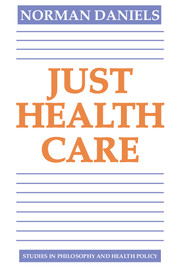Book contents
- Frontmatter
- Contents
- Preface
- Acknowledgements
- 1 Is health care special?
- 2 Health-care needs
- 3 Toward a distributive theory
- 4 Equity of access to health care
- 5 Am I my parents' keeper?
- 6 Doing justice to providers
- 7 Doth OSHA protect too much?
- 8 Risk and opportunity
- 9 Philosophy and public policy
- Works cited
- Index
1 - Is health care special?
Published online by Cambridge University Press: 05 June 2012
- Frontmatter
- Contents
- Preface
- Acknowledgements
- 1 Is health care special?
- 2 Health-care needs
- 3 Toward a distributive theory
- 4 Equity of access to health care
- 5 Am I my parents' keeper?
- 6 Doing justice to providers
- 7 Doth OSHA protect too much?
- 8 Risk and opportunity
- 9 Philosophy and public policy
- Works cited
- Index
Summary
Micro and macro
Medical ethics, a child of the 1970s, has thrived on the exotic. It has fed on new life-and-death dramas: Should aggressive treatment be stopped for a terminal patient with metastasized bone cancer, or started for a hydrocephalic newborn with open spinal lesions? Which of several medically eligible patients should receive the life-saving liver transplant? Should a leukemic child's parents be allowed to switch him from chemotherapy to laetrile? These dramas are modern morality plays. They feature the patient as Everyman who must find his way in a land of mystical medical powers, ruled by the High Priest Technology. These real dramas are reenacted in classroom case studies, or in the media, where they have the flavor of TV soaps: the villain, the paternalistic doctor, threatens Everyman's autonomy, until he is rescued by the good Doctor Informed Consent. There are many variations on the plot. Is the geriatic patient with Alzheimer's disease competent to agree to amputation of his foot and commitment to a nursing home? Should a physician tell one of his female patients that her fiancé, who is also one of his patients, is homosexual or is sterile? Though exotic, these dramas have a universal appeal. It is easy to imagine participating in them first hand, as a patient, family member, or practitioner. Moreover, these problems of individual or micro decision-making are forced on us by biology, technology, and very general moral concerns.
- Type
- Chapter
- Information
- Just Health Care , pp. 1 - 18Publisher: Cambridge University PressPrint publication year: 1985



